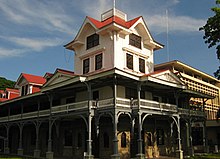
Back Unibersidad kan Silliman BCL Silliman University CEB Silliman University German Silliman University English Universidad Silliman Spanish Unibersidad ti Silliman ILO Silliman University NB Silliman University PAM Silliman University Swedish Pamantasang Silliman Tagalog
Pamantasang Silliman | |
 Silliman Hall | |
| Latin: Universitas Sillimaniensis | |
Former names | Silliman Institute (1901–1938) |
|---|---|
| Motto | Via, Veritas, Vita (Latin) |
Motto in English | The Way, the Truth, and the Life |
| Type | Private, nonsectarian, research university, coeducational |
| Established | 28 August 1901 |
Religious affiliation | United Church of Christ in the Philippines, but independent in governance.[1] |
Academic affiliations | ACUCA, UBCHEA, "ACSCU". Archived from the original on 22 June 2011., ASAIHL, PAASCU, ATESEA |
| Chairman | Ricardo A. Balbido Jr. |
| President | Dr. Betty Cernol McCann, PhD |
Academic staff | 490 (Faculty) 290 (Staff)[2] |
| Students | 9,688[3] |
| Location | (Main Campus) , , 9°18′46″N 123°18′24″E / 9.31278°N 123.30667°E |
| Campus |
|
| Alma Mater song | Silliman Song |
| Colors | Red and White |
| Nickname | Sillimanian |
Sporting affiliations | PRISAA, UNIGAMES[4] |
| Mascot | Stallions and Mares |
| Website | www.su.edu.ph |
Silliman University, sometimes simply called Silliman or SU, is a private Christian university in Dumaguete City, Philippines. The school first started in 1901 when American Presbyterian missionaries came to the Philippines after the war between America and Spain ended. Because of this, Silliman became the first Protestant and American private school in the country.[5] It is also the oldest university founded by Americans in Asia.[6][7] At first, they started it as an elementary school for boys. But later on, it became a college, and then into a university. The man who was first sent by the Presbyterians to start the school was David Sutherland Hibbard, a pastor from Lyndon, Kansas. On the other hand, the one who gave the money to start it was Horace Brinsmade Silliman, a businessman from Cohoes, New York. Thankful for what Silliman did, the Presbyterians named the school after him.[8]
Today, Silliman has ten colleges, four schools, and two institutes.[9] Its students come from different parts of the Philippines, as well as from other parts of the world (more than 20 different countries).[10] Silliman offers early childhood, elementary, high school, and college education. In college, Silliman teaches many things such as Accountancy, Business Administration, Engineering, Information Technology, Law, Medicine, Nursing, Biology, Chemistry, Education, Marine Sciences, Physics, Theology, Philosophy, Psychology, and Public Administration among others. Those who want to take up masters and doctorate courses can also find these in Silliman.[9] Aside from teaching, Silliman is also involved in activities called "extension projects" that help people and different communities.[11][12]
- ↑ The University is governed by an independent Board of Trustees with the UCCP being one of the three sectors represented in the Board. Pursuant to its Articles of Incorporation, five of the fifteen members of its Board of Trustees come from the UCCP. Though Protestant in origin and orientation, its academic policies are non-sectarian.
- ↑ "University Conference Achieves High Participation Turnout". SU NetNews. Retrieved 2 July 2011.
- ↑ "University Enrollment Up by 3.1%". Silliman University. Retrieved 11 August 2014.
- ↑ Maricar Aranas. "SU to host UNIGAMES" Archived 16 August 2010 at the Wayback Machine. Visayan Daily Star. Retrieved 7 June 2012.
- ↑ "NHI Resolution No.7, Series 2002" Archived 2011-07-21 at the Wayback Machine. National Historical Institute. Retrieved 14 April 2010.
- ↑ Dexter R. Matilla "Heritage Diary of Negros Oriental" Archived 2018-03-12 at the Wayback Machine. Philippine Daily Inquirer. Retrieved 18 December 2009.
- ↑ "Dumaguete’s Famous University: Silliman". PhilippineInsider.com. Retrieved 17 December 2009.
- ↑ Tiempo, Maslog & Sitoy 1977, pp. 49–52
- ↑ 9.0 9.1 "Schools and Colleges" Archived 2009-06-09 at the Wayback Machine. Silliman University. Retrieved 7 December 2009.
- ↑ "University History" Archived 2009-01-30 at the Wayback Machine. Silliman University. Retrieved 7 December 2009.
- ↑ "Extension program receives national award" Archived 2010-07-14 at the Wayback Machine. SU Net News. Retrieved 7 December 2009.
- ↑ "Projects in the Philippines"[permanent dead link]. International Development Research Center. Retrieved 7 December 2009.